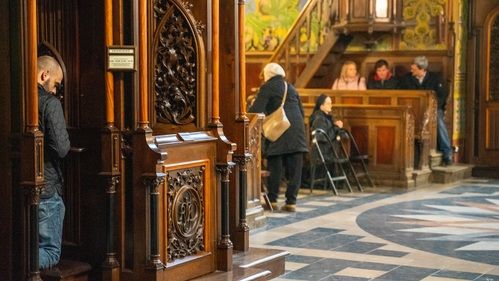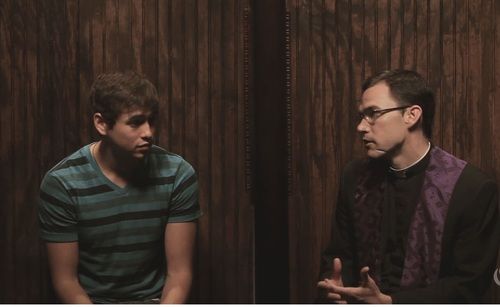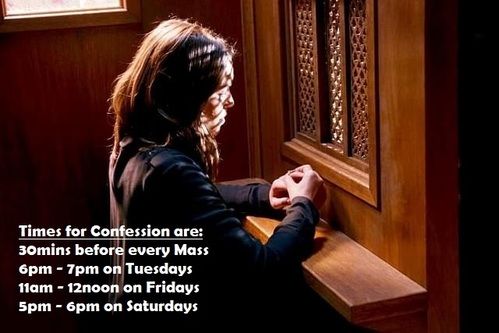

The Sacrament of Confession
Sin is a serious matter, so serious that God was prepared to be crucified to save us from our sins.
When we go to Confession the salvation won for us upon the Cross is applied to us individually and those sins we confess are forgotten by God.
The Catechism of the Catholic Church teaches:
1485 "On the evening of that day, the first day of the week," Jesus showed himself to his apostles. "He breathed on them, and said to them: 'Receive the Holy Spirit. If you forgive the sins of any, they are forgiven; if you retain the sins of any, they are retained"' (Jn 20:19, 22-23).
1486 The forgiveness of sins committed after Baptism is conferred by a particular sacrament called the sacrament of conversion, confession, penance, or reconciliation.
1487 The sinner wounds God's honour and love, his own human dignity as a man called to be a son of God, and the spiritual well-being of the Church, of which each Christian ought to be a living stone.
1488 To the eyes of faith no evil is graver than sin and nothing has worse consequences for sinners themselves, for the Church, and for the whole world.
1489 To return to communion with God after having lost it through sin is a process born of the grace of God who is rich in mercy and solicitous for the salvation of men. One must ask for this precious gift for oneself and for others.
When we go to Confession and confess our sins God, in His love and mercy forgives us. Whatever is said to the priest in the confessional can never be revealed by him, there is a 'Confessional Seal' which may never be broken.
When we go to Confession the salvation won for us upon the Cross is applied to us individually and those sins we confess are forgotten by God.
The Catechism of the Catholic Church teaches:
1485 "On the evening of that day, the first day of the week," Jesus showed himself to his apostles. "He breathed on them, and said to them: 'Receive the Holy Spirit. If you forgive the sins of any, they are forgiven; if you retain the sins of any, they are retained"' (Jn 20:19, 22-23).
1486 The forgiveness of sins committed after Baptism is conferred by a particular sacrament called the sacrament of conversion, confession, penance, or reconciliation.
1487 The sinner wounds God's honour and love, his own human dignity as a man called to be a son of God, and the spiritual well-being of the Church, of which each Christian ought to be a living stone.
1488 To the eyes of faith no evil is graver than sin and nothing has worse consequences for sinners themselves, for the Church, and for the whole world.
1489 To return to communion with God after having lost it through sin is a process born of the grace of God who is rich in mercy and solicitous for the salvation of men. One must ask for this precious gift for oneself and for others.
When we go to Confession and confess our sins God, in His love and mercy forgives us. Whatever is said to the priest in the confessional can never be revealed by him, there is a 'Confessional Seal' which may never be broken.


How often should we confess?
It is a good thing for us to go to Confession at least once a month.
Forming this habit shows that we take our relationship with God and our Neighbour seriously and also how serious we are about avoiding sinful situations.
Frequent and regular confession enables us to be aware of our small sins before they grow into bigger ones!
Forming this habit shows that we take our relationship with God and our Neighbour seriously and also how serious we are about avoiding sinful situations.
Frequent and regular confession enables us to be aware of our small sins before they grow into bigger ones!
When can i go to confession
